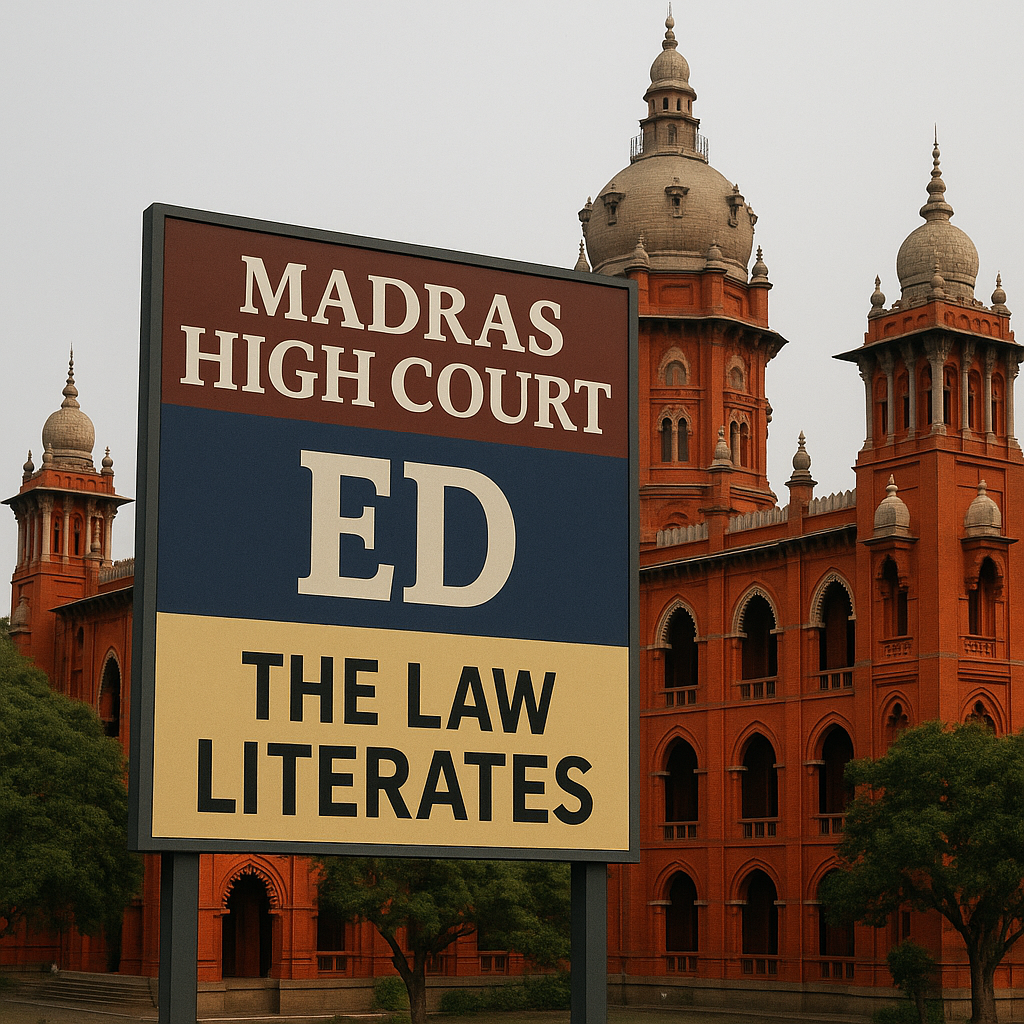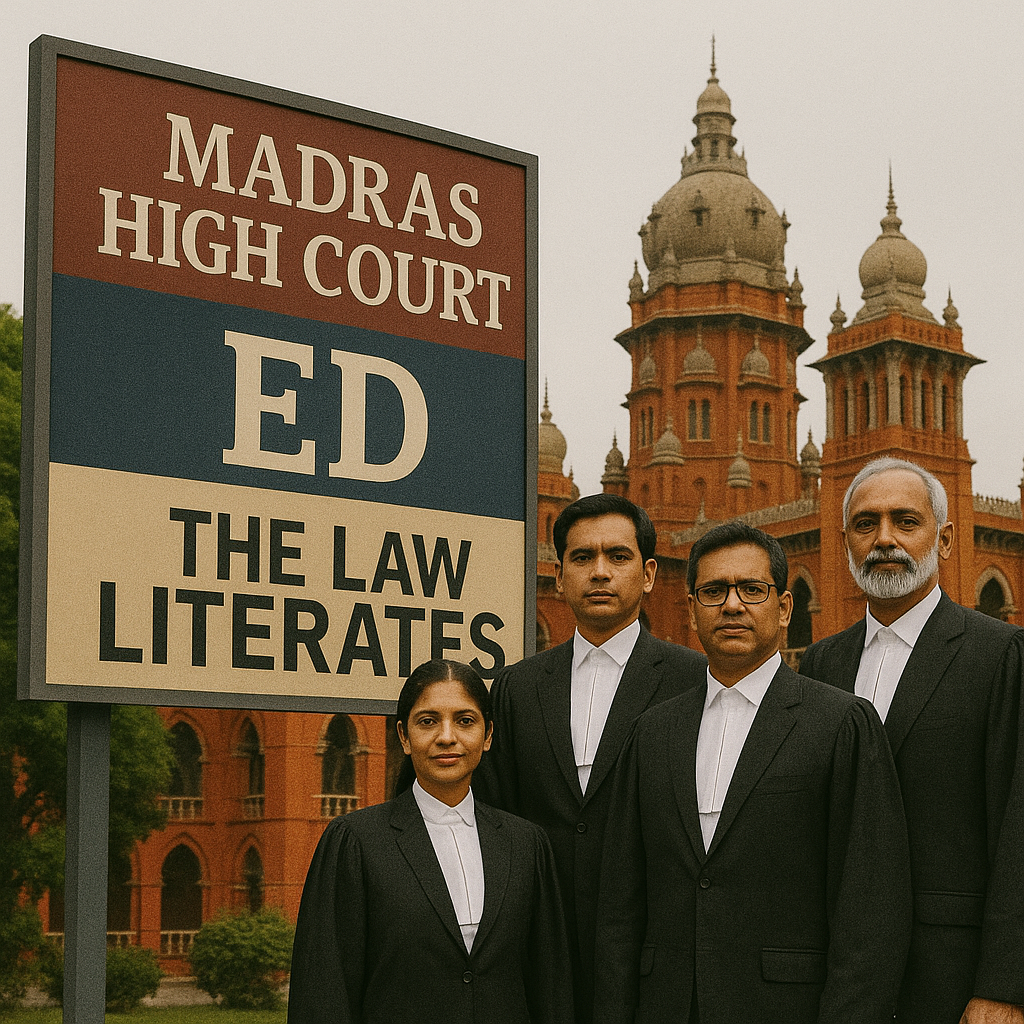Madras High Court: ED Cannot Overstep Mandate, not a ‘Super Cop’ to Investigate All Crimes
Introduction
In a significant ruling, the Madras High Court has reiterated that the Enforcement Directorate (ED) cannot act as a ‘super cop’ with no limitation on powers to investigate any and every criminal activity without adhering to statutory limits reiterating the fundamental need to ensure that the agency does not expand its mandate beyond what Parliament has envisaged. Recently, the Enforcement Directorate (ED) has emerged as one of the most powerful investigative agencies in India’s legal landscape. Tasked primarily with enforcing laws related to money laundering and foreign exchange violations, the ED was envisaged as a specialised agency with a clear, limited mandate under the Prevention of Money Laundering Act, 2002 (PMLA) and the Foreign Exchange Management Act, 1999 (FEMA). However, there is growing concern that the agency has increasingly overstepped its statutory boundaries, launched investigations and taken coercive actions even in cases where there is no legally recognised predicate offence or where the alleged wrongdoing falls squarely within the domain of other statutory authorities. Such overreach not only violates the well-established principle that an investigative body must act strictly within the four corners of its enabling statute, but also creates unnecessary legal harassment, overlapping proceedings, and chilling effects on legitimate business activities.
Background
The matter was initially heard by a Division Bench of the Madras High Court. After hearing the contention of both the parties, the Court came to
the following conclusion – “in the absence of there being any predicate offence under the Customs Act, 1962, for the present, and the fact that the alleged offence under the FEMA, 1999, is not a predicate offence under the PML Act, 2002, it follows that there cannot be any offence of money-laundering under Section 3 of the PML Act, 2002 qua these offences. Consequently, a writ of mandamus is issued restraining the Enforcement Directorate from exercising its powers under the PML Act,2002, qua the investigation of alleged money-laundering in respect of these offences alone. We make it abundantly clear that we have not interdicted the investigation pertaining to the allegations of money-laundering qua the predicate offences forming the subject matter of FIR No. RC 219 2014E 0018 which is being by investigated the CBI.” Aggrieved by the High Court’s decision, the ED filed a Special Leave Petition (SLP) before the Supreme Court. While the appeal was pending, the CBI filed a supplementary final report. This supplementary report concluded that there was sufficient incriminating material to justify prosecution under Sections 120-B read with 420 and 471 of the Indian Penal Code (IPC) and under Section 13(2) read with Section 13(1)(d) of the Prevention of Corruption Act, 1988. Following the filing of this final report, the ED withdrew its SLP before the Supreme Court.
Subsequently, the ED conducted fresh searches between 31 January 2025 and 1 February 2025 at the premises of the Directors and holding companies associated with RKMP. On 31 January 2025 itself, the ED issued a freezing order under Section 17(1A) of the PMLA, freezing fixed deposits amounting to ₹901 crore. The present writ petition challenges the said order.
Submission of Petitioner and Respondent One of the principal arguments advanced by the petitioner’s counsel was that the concept of “round tripping”, which formed the basis for the ED’s investigation, could not be a valid ground for action under the PMLA. The petitioner argued that the CBI, in its final report, had already indicated that this aspect should be examined under FEMA which is not a scheduled offence under the PMLA and therefore could not give rise to a money-
laundering offence. In response, Mr. AR.L. Sundaresan, learned Additional Solicitor General of India appearing for the ED, submitted that the power to pass a freezing order under Section 17(1A) of the PMLA is intrinsically linked to Section 17(1). According to him, if there are “proceeds of crime”, the authority is empowered to freeze or attach assets even in the absence of an established predicate offence at that stage. Essential to show link between the alleged offence and the actCiting the stance of the supreme court in the case of Vijay Madanlal Choudhary, the bench held that the condition precedent for an enquiry by the ED is the existence of a predicate offence. The predicate offence, which led the CBI to file a final report, is the coal allocation scam case. The alleged offence of “round tripping” of funds, diversion of public loans and misuse of share premiums are not relatable to coal allocation scam.
Emphasising the statutory scheme under the Prevention of Money Laundering Act (PMLA), the Court observed, “The ED is not a loitering munition or drone to attack at will on any criminal activity.” The observations came while quashing an order by the ED that froze fixed deposits worth ₹901 crore belonging to RKM Powergen (RKMP) under Section 17(1A) of the PMLA. The court said that plea of ED that the aforesaid three aspects have led it to withdraw the SLP and continue with its investigation. Even assuming that they are true, for the purpose of ED to investigate into these aspects, there should have been a complaint at the instance of the Power Finance Corporation and other financial institutions, who had lent monies to RKMP, for ED to swing into action. Court’s Decision The Court stressed the principle that when a statute prescribes a specific procedure, the same must be strictly followed. “Unless and until proceeds of crime linked to the predicate offence are shown, the ED by virtue of a combined reading of Sections 2(1)(u), 2(1)(p), 3 read with Section 17, lacks the jurisdiction to proceed further,” the Court ruled, setting aside the freezing order. The Court made it clear that the ED cannot derive jurisdiction merely because another agency, like the CBI, has filed a final report. Unless the alleged acts are linked to the predicate offence and proceeds of crime are established, the ED has no power to proceed under the PMLA.
Case Name – RKM Powergen Private Limited v ED & Or
Written By : Aryan Shrivastav LC 1, Delhi University
all rights reserved (Vaibhav Tomar adv)



nice one